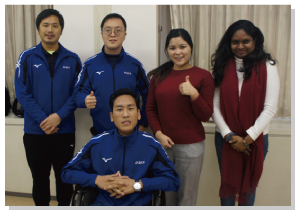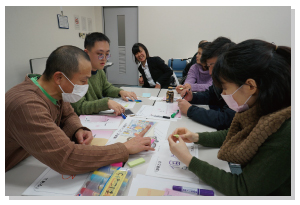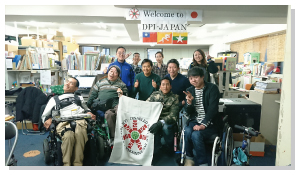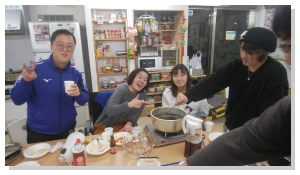- HOME
- Alumni News
- Su, Nan (participated in the 20th Program)
- Final Report
Final Report
Nan's Final Report
Towards achieving inclusive society
1. About myself and the reason why I decided to come to Japan
I am Su Nan, I am from Taiwan. I was born in 1991 in Taipei City. With cerebral palsy since birth, I have always used a wheelchair for going out. Before coming to Japan, I was working for the student counseling center of Ming Chi University of Technology, New Taipei City, as a coordinator to support students with disabilities. Outside of work, I was, and still am, involved in an organization by persons with disabilities called Taiwan Association for Disability Rights.
Although Taiwan is a diverse and highly industrial society, welfare for persons with disabilities still has a long way to go with many issues that need to be overcome. I decided to visit Japan to improve the welfare for persons with disabilities in Taiwan, and to learn about Japan’s current welfare system for persons with disabilities. Another goal of my training was to learn the Japanese language, Japanese manners, as well as to interact with Japanese persons with disabilities and organizations for / by people with disabilities, and to experience Japanese lifestyle and culture.

2. Training programs
From October 2018 through to May 2019, I visited many facilities and organizations for / by people with disabilities for my training programs. I witnessed and engaged in many activities. Here are the details.
(1) Japanese language classes
When I arrived in Japan I already knew enough Japanese for day-to-day communication, as I had engaged in language exchange sessions in Taiwan with Japanese people who lived there. Because of this, my Japanese lessons from October to December 2018 was mainly private one-on-one lessons and on-the-job training (hereafter “OJT”). In the private lessons, I studied business conversations, reading comprehension, role-playing, and speech presentations. I also had OJT at the Japanese Society for Rehabilitation of Persons with Disabilities (JSRPD). Assisting JSRPD’s operations also helped brush up my Japanese. My business manners also improved as I attended the Japanese language classes of other trainees and talked about the lessons in a blog article, and also from helping the staff of the Japan Disability Forum organize their Parallel Report Special Committee.
(2) Nagoya City-Handi Marathon
In October 2018, I went to the AJU Center for Independent Living, Nagoya, and participated in a marathon for the handicapped which was actually a marathon that anyone with or without disability was eligible to enter, themed on “Full participation and equality”. It was the first time I had ever participated in a public sporting competition. It was also an opportunity for me to learn more about activities toward a co-living society.
(3) Home-stay program
In December 2018, I stayed with the Oyabu Family in Kyoto for a home-stay program. We had a great time together from the end of the year to the New Year. With the family, I experienced Japanese culture, pounding rice cake, and visiting famous spots such as the Kinkakuji Temple in Kyoto and the Todaiji Temple in Nara.
(4) Center for Independent Living Honyara
During my individual training program in January 2019, I had my first encounter with the concept of independent living. The program was nearly a month-long at the Center for Independent Living Honyara and the Center for Independent Living IROHA, in Ibaraki. I lived alone in an experiential independent living room with barrier-free facilities, visited a home of a person with a severe physical disability and went into town with people with disabilities and their personal assistants to look for rooms they could rent. There was also a DET (Disability Equality Training) program that made me think more about disability and the way towns should be designed to make living easy for everyone. I saw with my own eyes that despite severe disabilities we could live a normal and independent life in our community.

(5) Ski training
In late January 2019, we went to Niigata for our ski training program at Ski School Neige for Persons with Disabilities. At first I thought skiing would be asking a bit much with my physical disability, but Neige provided means for all of us to ski, accommodating our different disabilities. I enjoyed skiing with “bi-skis” and truly understood that such sport is not impossible for people with disabilities, as long as the sport is adapted, and other reasonable accommodations are provided.
(6) Japan National Assembly of Disabled Peoples' International (DPI-Japan)
In February 2019, I attended a one-week individual training program at Japan National Assembly of Disabled Peoples' International (DPI-Japan, hereafter “DPI”), Tokyo, to study consultations and support for / by people with disabilities in Japan, and their activities for advocacy. I learned about the activities and history of DPI’s Advocacy Center and Women’s Network. I also listen to the personal history of people with disabilities. Through these real stories, I learned about the current status and problems of Japan’s barrier-free society and advocacy movement.

(7) Human Care Association
From February through to March 2019, I spent one month on individual training at Human Care Association, a center for independent living in Tokyo, as well as at CIL Hino and the Japan Council on Independent Living Centers, to learn more about independent living of persons with disabilities. Before the training, I had believed what society believed; that independent living meant living without depending on anyone. But my perception took a turn after I listened to Mr. Nakanishi from Human Care Association talk, who pioneered Japan’s independent living movement, as well as other pioneers, and as I accompanied more disability organizations as they visited government agencies for negotiations. I began to see things in a new light and learned that independent living for people with disabilities meant making a choice for oneself (choosing one’s own lifestyle oneself), deciding for oneself (making decisions about one’s life oneself), and taking responsibility (taking responsibility for the decisions one has made). I learned about personal assistance service that supports independent living of people with disabilities, and about peer support (consultation service by peers). I even tried my hand at cooking during the ILP (Independent Living Program) and attended home parties with a personal assistant. I also studied peer counseling and tested leading a peer counseling group. Through these hands-on experiences I learned how people with disabilities can support one another.
(8) Mainstream Association
From March through to April 2019, I visited Mainstream Association, a center for independent living in Hyogo, as well as Independent Living ”MUCHU” Center, and the Center for Independent Living ”Partner” in Osaka. During the one-month individual training program, I learned about independent living of persons with disabilities through hands-on activities. The centers in Kansai gave me many more opportunities than at other training locations to interact with peers. We went out to enjoy ourselves, cooked together, stayed at each other’s homes, stayed up late and chatted with a few drinks. All these are wonderful, colorful memories of friends with disabilities, interacting with one another. These were ordinary yet extraordinary times together. I understood the delight and importance of people with disabilities living an independent life, learned how centers of independent living are operated and how places could be created for everyone to belong to.
3. My thoughts on the training
During the training period, I was blessed with the opportunity to see the current status of welfare for people with disabilities in Japan, and how people with disabilities actually lived in Japan. In Japan, people with disabilities can, even if they have a severe disability, live alone normally in the community with the independent living system and various reasonable accommodations, and could even live a more interesting life than people without disabilities. In Japan, people with disabilities are not just being helped by others but work as members of the staff at centers for independent living, offering various support to other people and contributing to society. I was deeply touched by the fact that people with disabilities actually have more potential than imagined.
4. My resolve after going home
After I go home, I will endeavor to improve welfare for persons with disabilities in my country, based on what I was fortunate enough to learn in Japan. I will pursue my dream of realizing a society that makes living together possible, no matter how severe our disability or hardship is, where living a normal life with dignity is possible. For that dream, I will first communicate what I learned in Japan. I will also support every person with disabilities through activities at an organization for persons with disabilities. I will cooperate and co-work with local CILs, engage in activities together, expand the network of persons with disabilities and involve more young people who can work with us. I will also go back to my job at the college to support students with disabilities and offer support for them to start living independently.
If I dream alone it will be merely a dream. But I strongly believe that if people with disabilities dream the dream together, involving other people in the community, the dream will bear fruit.
I owe so much to everyone at the Duskin AINOWA Foundation, the Japanese Society for Rehabilitation of Persons with Disabilities, and everyone at my training destinations. I thank you from the bottom of my heart.





